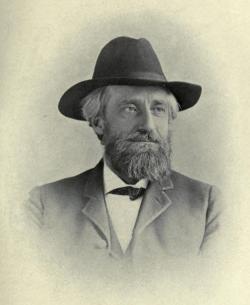
I’ve been investigating a pseudo-Darwin quotation, “Not one change of species into another is on record … we cannot prove that a single species has been changed.” As I explained in part 1, and as the Talk.Origins Archive Quote Mine Project already disclosed, the second half is from The Life and Letters of Charles Darwin (1887), although the words are not Darwin’s but his son’s gloss. The first half, however, seems to have originated in Theodore Graebner’s Evolution: An Investigation and a Criticism (1921), which asserts, “Now, as a matter of fact, we cannot prove that a single species has changed” and then misquotes Darwin as saying, “There are two or three millions of species on earth, sufficient field, one might think, for observation. But it must be said to-day, that in spite of all the efforts of trained observers, not one change of species into another is on record.” The source of the first assertion is already known, but what about the passage misattributed to Darwin?
As I mentioned in “The Two Theodores,” Graebner (1876–1950), a Lutheran theologian who spent the bulk of his career at the Lutheran Synod of Missouri’s Concordia Seminary in St. Louis, Missouri, was a prolific author, producing no fewer than three books on evolution: Essays on Evolution (1925) and God and the Cosmos: A Critical Analysis of Atheism (1932) in addition to Evolution: An Investigation and a Criticism. His education was mainly theological, but he was fascinated by biology (having read the Origin at the age of sixteen, if admittedly with imperfect understanding) and even taught the topic at the Lutheran Ladies’ Seminary in Minnesota; Numbers quotes him as describing his qualifications as a “real scientist” in virtue of having taken “a college course in natural science, [having] taught biology for six years, [having] devoted my leisure time to it for 30 years, [having] read all the modern college texts in biology, [and having] made special studies in museums and private collections.”
So it seems unlikely that Graebner would have confected the passage he misattributed to Darwin from whole cloth. Since the most distinctive feature of the passage was the estimate of “two or three millions of species,” I started looking for pre-1921 estimates of the number of species. It wasn’t long before I found the geologist Nathaniel S. Shaler writing, in “Faith and Nature” in The International Quarterly in 1902/1903, “… it is not yet satisfactorily proved that a single species of the two or three millions now inhabiting the earth had been established solely or mainly by the operation of natural selection.” And guess what? The sentence following the pseudo-Darwin quotation in Graebner’s book is: “Dr. N. S. Shaler, Professor of Geology in Harvard, asserts that ‘it has not been proved that a single species has been established solely or even mainly by the operation of Natural Selection.’” It is likely, then, that what’s at work here is simple carelessness in Graebner’s process of composition.
That seems especially plausible in light of Graebner’s writing habits. According (PDF) to a study of Graebner’s career in the Missouri Synod by Mark E. Braun, published in Wisconsin Lutheran Quarterly in 2009, he “maintained lifelong, compulsive reading habits on many subjects and was known always to carry a pair of scissors in his coat pocket to snip articles for further reference,” and recommended that young pastors should “clip articles from a range of popular publications, gather them according to subject and lay them away in a place by themselves.” His son remembered, “he was able to lay out his source materials before himself and dictate a first and final draft” immediately to his secretary. This strikes me as the sort of procedure that could easily result in the inadvertant production of chimeras like the quotation under discussion, in which the words of Charles Darwin, his editor Francis Darwin, and Nathaniel Shaler are mistranscribed, misattributed, and jumbled together.
By the time that he compiled Essays in Evolution (1925), Graebner seems to have improved his scholarly practice. True, it’s hard to date the contents with precision, since the book consists of essays reprinted with revisions from various publications, but “The Conflict” refers to the Scopes trial as in process, so presumably it was composed, or at least revised, in 1925. There, in a passage paralleling the passage from Evolution: An Investigation and a Criticism to which I’ve devoted so much attention, Graebner writes:
Indeed, although there are two or three millions of animal species on earth, it has, according to Dr. N. S. Shaler, Professor of Geology in Harvard, not yet been proved that a single species has been established solely or even mainly by the operation of natural selection. Even Darwin himself said: “We cannot prove that a single species has changed.” (Life and Letters, Vol. III, p. 25.)
Except for ascribing Francis Darwin’s editorial gloss to Darwin himself, and for overlooking the fact that Shaler’s estimate was of animal and plant species, not just animal species, and for conflating Shaler’s question (whether natural selection is capable of explaining speciation) with Darwin’s question (whether there is observable evidence of speciation), and for not acknowledging the grievous misquotation in his previous book, there’s practically nothing to complain of here!

